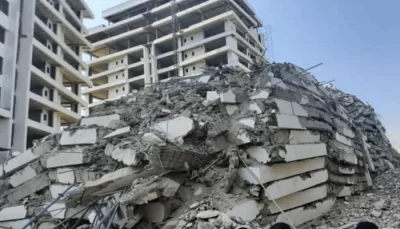What Ikoyi building collapse means for housing stakeholders
These stakeholders, the experts explain, include the government for regulatory function, investors, financiers and buyers who are consumers of housing products.
Though Nigerians are still waiting for the panel set up by the Lagos State government on the building collapse to complete its assignment before passing judgment, it is generally agreed that whatever caused the collapse could not be unconnected to regulatory failures and non-compliance.
“The Ikoyi building collapse means the government and its agencies are not doing enough. They have to up their game because a lot of times developers find willing allies in government offices responsible for physical planning, urban development and building control,” according to MKO Balogun.
That means too that even within its agencies, the government has a lot of work to do.
Balogun notes that time has come for the government to be decisive on infringement of building development codes and laws, recommending that buildings that violate laws should not only be stopped, but also demolished and all affected persons prosecuted and jailed.
The collapse of Ikoyi building, also known as 360 Towers, has implications for project financiers too. Tayo Odunsi, CEO, Northcourt Real Estate, sees a significant increase in construction risk financing going forward.
Odunsi explains to BusinessDay in a telephone interview that “financiers are going to be a lot more cautious and will be asking a lot of questions on developers’ antecedents before committing funds to a project. They will be making demands from the developers on issues bordering on regulatory compliance and the kind of project partners they have assembled.”
“This means that it is going to take a little longer to deliver a project than before because financiers have to take their time to do all the due diligence,” he says, pointing out however that the Ikoyi building collapse would benefit big players in the sector who have built reputation and integrity over the years.
For investors and developers, the building collapse is a huge lesson on integrity and compliance with building regulations and permit, because, as Balogun states, “it is not enough to blame government officials who collude with developers to do wrong things; it is important to stop private people from going to seek approval for the wrong things.”
“Property developers must desist from shortcut method while trying to cut cost, which leads to losses and at the same time cause death of innocent citizens,” Olabisi Demola-Alade, chairman, Nigerian Institution of Estate Surveyors and Valuers (NIESV), Lagos State chapter, advises.
She notes that developing a real estate facility for sale or lease requires the developer to see the project beyond profit and prestige, but to see it as a major component of community and national development such that any wrong steps or process failure, deliberate or unintended, can lead to major consequences.
This presupposes that, more than ever before, investors have to have integrity alongside their business mind. According to Demola-Alade, “Real estate investors and developers should protect their investments and also save lives by embracing ethical practices while carrying out their business.”
Balogun agrees, adding, “Relevant development control should start from registration of permits, not when the development has commenced and it is almost completed. Government should ensure only professionals certified by relevant professional bodies are involved in housing development.”
For house buyers, the collapsed building is a good eye-opener. It is time to not only look, but also to ask pertinent questions. The era of buying through 3-D pictures is over. Perhaps, before now, many buyers never knew it was possible to buy unsupervised houses or those whose specifications were not approved. All these define the collapsed Ikoyi building.
Too many experts in the built environment, the collapsed Ikoyi building was a disaster waiting to happen. “The collapse of a 21-storey structure or building is definitely an infrastructure and engineering failure,” Ali Rabiu, president, Council for the Regulation of Engineering in Nigeria (COREN), says.
Oladipo Agida, the CEO, Dradrock Real Estate, also says the building was doomed to go the way it did, saying, “We learnt that the government approved 15-floors for the developer, but he added six more floors. That alone says it all that the building was a disaster waiting to happen because the six more floors came with additional load, which the building’s foundation was not prepared to carry.”
A professional builder, who does not want to be named, notes that for the building to collapse means there were no professionals on ground to supervise the construction as it progressed. The builder wondered why work had to resume on a building that was sealed and a stop work order issued, yet the regulatory authority looked away.
“Why was the building sealed in the first place; what was wrong that led to the stop work order; what did the developer do differently that made the government to unseal the building; who was the project supervisor from the government building control agency?” the builder asks.


